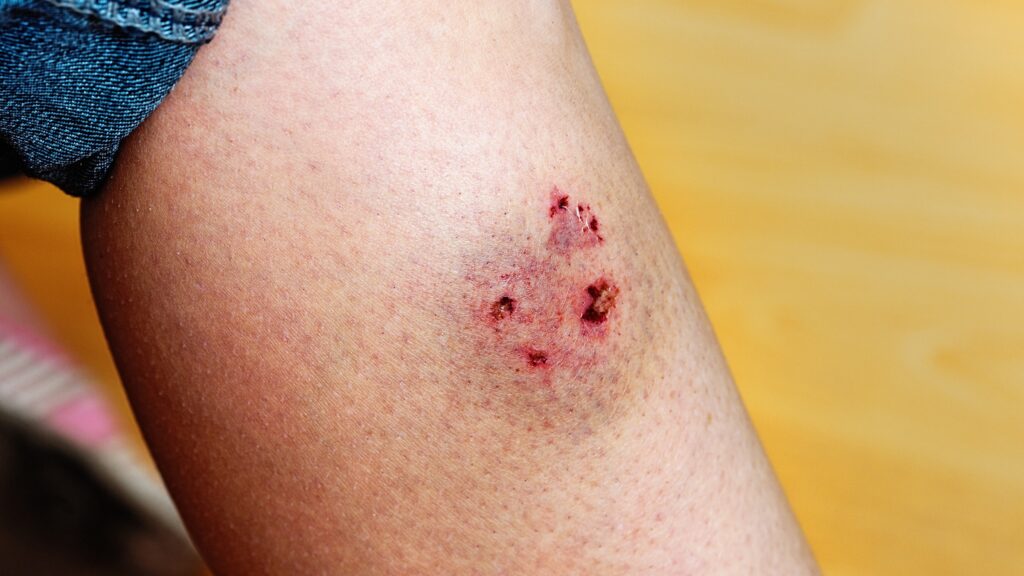Minor skin wounds, including cuts, scrapes, and abrasions, are common injuries that can cause discomfort and pain. While these wounds typically heal on their own, proper care is essential to prevent infection and promote faster recovery. In this article, we will explore the causes of minor skin wound pain, effective treatments, and home remedies to ensure optimal healing.

Causes of Minor Skin Wound Pain
Pain from a minor skin wound is caused by several factors, including:
- Tissue Damage: Nerve endings in the skin react to the injury, leading to pain and tenderness.
- Inflammation: The body’s natural healing response triggers redness, swelling, and warmth, which can contribute to discomfort.
- Infection: If bacteria enter the wound, it may become infected, increasing pain and slowing healing.
- Drying and Crusting: Scabs form as wounds heal, which can tighten the skin and cause discomfort.
Symptoms of Minor Skin Wounds
- Sharp or stinging pain at the injury site
- Redness and swelling around the wound
- Minor bleeding, followed by clotting and scabbing
- Itching and tightness as the wound heals
- Increased pain if infection develops (accompanied by pus, warmth, or spreading redness)
First Aid and Immediate Treatment
Proper wound care is crucial to minimizing pain and preventing complications. Follow these steps for immediate treatment:
- Clean the Wound: Rinse with clean water and mild soap to remove dirt and bacteria.
- Apply an Antiseptic: Use hydrogen peroxide, iodine, or an antibiotic ointment to prevent infection.
- Cover with a Bandage: Protect the wound with a sterile dressing to keep it moist and shielded from contaminants.
- Manage Pain: Over-the-counter pain relievers like ibuprofen or acetaminophen can help reduce discomfort.
- Change Dressings Regularly: Replace bandages daily or when they become wet or dirty.
Home Remedies for Pain Relief
For additional relief and faster healing, consider these natural remedies:
- Aloe Vera: Known for its soothing properties, aloe vera gel can reduce pain and inflammation.
- Honey: Has antibacterial properties that promote healing and prevent infection.
- Coconut Oil: Keeps the wound moisturized and reduces the risk of scarring.
- Cold Compress: Helps numb the area and reduce swelling.
- Turmeric Paste: A natural antiseptic that speeds up healing.
When to Seek Medical Attention
While minor wounds generally heal without complications, medical attention is necessary if:
- The wound is deep or does not stop bleeding after 10 minutes of pressure.
- Signs of infection appear, such as pus, warmth, or increasing pain.
- The wound was caused by a rusty or dirty object, requiring a tetanus shot.
- Healing is slow or worsens over time.
Healing Process of Minor Skin Wounds
The body follows a natural healing process, which includes:
This process usually takes a few days to weeks, depending on wound size and care.
Preventing Minor Skin Wound Pain
To avoid discomfort from minor skin injuries, follow these preventive measures:
- Wear protective gear when handling sharp objects or engaging in activities prone to cuts.
- Keep skin moisturized to reduce the likelihood of cracking and irritation.
- Maintain proper hygiene to prevent infections and complications.
- Ensure adequate nutrition, particularly vitamin C and zinc, to support skin repair.
Minor skin wounds are common but manageable with proper care and treatment. By cleaning wounds promptly, using appropriate pain relief methods, and following preventive measures, you can ensure quick and effective healing. If pain persists or signs of infection develop, consult a healthcare professional for further guidance.

